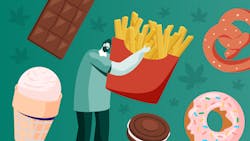‘The Haymaker’ is Leafly Senior Editor Bruce Barcott’s opinion column on cannabis politics and culture.
Amid the torrent of news this month, you may have missed an important announcement that came out last week in the Journal of the American Medical Association (JAMA).
Doctors wouldn't diagnose every wine drinker as an alcoholic. But that's what they're doing with cannabis consumers.
The US Preventive Services Task Force (USPSTF) recommended that primary care doctors screen their patients for unhealthy drug use. Cannabis use is included in the definition of “unhealthy drugs.” Tobacco and alcohol are not.
If that seems insane to you, that’s because you are the operator of a functional brain.
The US Preventive Services Task Force is a group of 16 experts in prevention and primary care medicine. The group is managed by the US Department of Health and Human Services, a federal agency. The task force bills itself as independent, but it ultimately answers to federal officials tasked with upholding prohibition and the absurdity of marijuana’s Schedule I status.
This is how systemic policies are built
The group’s recommendations matter because they help set healthcare industry standards. Their conclusions influence company policies in nationwide systems like Kaiser Permanente (Northern California), Mercy (St. Louis), Banner (Phoenix), and others.
“Drug screening” in this context doesn’t mean conducting secret toxicology reports on your urine or blood sample. The Task Force is talking about a verbal or written screening conducted by your doctor or office medical staff.
That sounds innocuous. And in some cases it may be. The devil, of course, is in the details. And those details are troubling.
Look at the data
Screening doesn’t work: This is what studies in the Task Force’s own report concluded. Why? Because stigma and a distrust of doctors lead patients to lie. In a 2010 study of VA patients, “primary care-based screening missed more than 60% of those with unhealthy alcohol use.”
Given the structural mindset of our healthcare system, patients have every reason to lie.
In some healthcare clinics, patients who consume cannabis find themselves shamed and categorized as potential drug-seekers (ie, faking a condition to gain access to drugs.) Doctors may be less likely to prescribe necessary pain medications. Some clinics simply refuse service to patients until they return and test clean. For years, military veterans using cannabis to manage their PTSD lived in fear of being found out by their VA doctors, lest they lose their hard-earned health benefits.
Doctors aren’t parents, patients aren’t children
Patients of color face even greater suspicions and negative consequences. In a recent Drug Policy Alliance forum on racism and recovery, addiction medicine specialist Lisa Puglisi noted the infantilizing tendencies of the American healthcare system. “You have to be good,” she said. “And if you’re good, you get a prize. And that prize is your life back.”
And then there’s this: “No studies have directly looked at” the connection between primary care screening and the reduction of harmful drug use. That’s a direct quote from the Preventive Services Task Force bulletin. There are no studies backing up their recommendation, and yet the Task Force “concludes with moderate certainty” that screening will have a moderate health benefit.
Shop highly rated dispensaries near you
Showing you dispensaries nearThat’s a hard pill to swallow for those of us who have seen federal bodies like this one ignore and deny dozens of peer-reviewed studies on the efficacy and health benefits of medical marijuana.
Cannabis use isn’t misuse
The USPSTF recommendation also perpetuates one of the most wrongheaded and harmful assumptions cannabis consumers hear from their doctors: the idea that cannabis use is synonymous with drug abuse.
In the report, USPSTF officials skip straight from the identification of illegal drug use (including, because they are a federal task force, cannabis) to a diagnosis of drug use disorder, and a recommendation for treatment.
That’s like diagnosing every adult who enjoys a glass of wine as an alcoholic.
I speak for millions of healthy cannabis consumers when I say: We are fed up with that willfully ignorant construction.
Warning signs
Do some cannabis consumers have an unhealthy practice? Absolutely.
Roger Roffman, one of the pioneers of research into American cannabis use, once put it to me this way: If you’re regularly skipping activities you enjoy to get high, that’s a sign; if cannabis is causing friction in your relationships, that’s a sign; if cannabis is interfering with your work, that’s a sign—a sign to reflect on your intake, and consider getting help to reduce or eliminate your usage.
Roffman’s advice is similar in spirit to the 11-symptom checklist for substance use disorder in the DSM-5. The problem is this: Too few primary care doctors know enough about cannabis to make that distinction. For most physicians, a patient in a legal state who reveals their moderate cannabis use will immediately be diagnosed as suffering from a drug use disorder.
Too many doctors know nothing about cannabis
Am I assuming too little of the doctors? I don’t think so. One year ago, Jama published an op-ed by a young graduate of the Stanford University School of Medicine, located in a state where medical marijuana has been legal for nearly 25 years. And yet he learned nearly nothing about cannabis in med school. “Marijuana has become an inescapable part of my medical training,” he wrote, “and most of my learning has come from patients.”
Leafly has also written about studies that found more senior citizens using legal cannabis—and fewer seniors talking to their doctors about it. Why? Because they fear being shamed by doctors who know nothing about cannabis except the drug war propaganda they were fed in middle school.
In 2020, with 34 states allowing legal medical marijuana and roughly 12% of US adults consuming, not knowing anything about cannabis is a form of medical malpractice.
What about alcohol and tobacco?
Finally, there’s the issue of tobacco and alcohol. As Ingrid Walker, Carl Hart, and others have discussed extensively, America’s social and medical conception of drugs needs to move into the 21st century. Alcohol is a drug. Caffeine is a drug. Tobacco is the world’s deadliest drug—it kills an average of 480,000 Americans every year.
And yet the US Preventive Services Task Force limits its definition of “unhealthy drug use” to the use of illegal drugs, or the misuse of prescription medications or household products.
The USPSTF report does recommend asking patients about alcohol and tobacco separately. But that misses the point—and a great opportunity. With this new recommendation, the USPSTF could have opened up a national conversation about American drug use, and what exactly constitutes both a “drug” and “unhealthy use.”
Instead, the 16 committee members chose to shuffle along, doing the same-old, same-old, perpetuating the very real problem of distrust among cannabis-using patients and their doctors.
USPSTF, consider this recommendation officially rejected.





